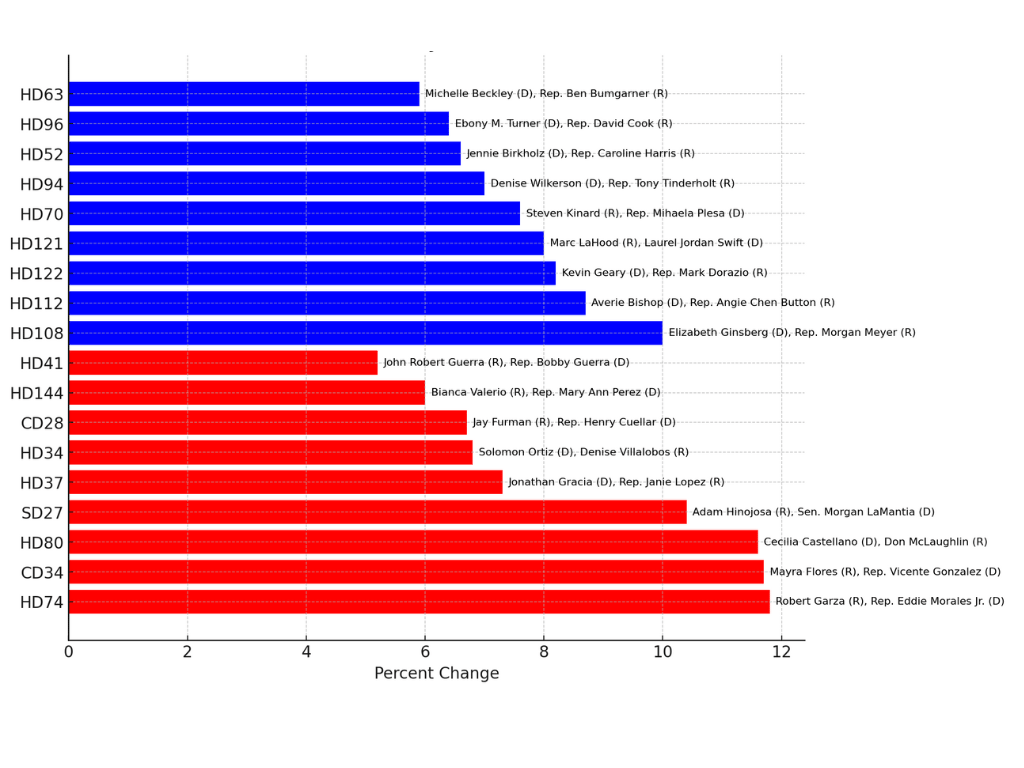- TXLege News
- Posts
- TXLege Election Day Countdown (T-80 Days)
TXLege Election Day Countdown (T-80 Days)
Key Predictions, Legislative Shifts, and What’s at Stake

By Jeff Blaylock - Founder & Senior Editor
August, 16, 2024
We begin the final sprint to Election Day with many things already known, or all but certain, and can speculate on some down-ballot impacts of the changing presidential race.
State Legislative Control Unlikely to Shift
The state House and Senate will remain solidly in Republican hands. Enough House seats are rated Safe Republican (47) or Likely Republican (30) to clinch the majority even if Democrats were to sweep everything else. Republicans should win most of the collective seats rated Lean Republican (8) and Toss Up (3), and the party should pickup at least one Democrat-held seat. We rate open HD80, where longtime Rep. Tracy King (D) is not seeking re-election, as Likely Republican. We have HD74, which is being defended by Rep. Eddie Morales, rated Lean Republican.
Any change in statewide leadership will thus depend on two factors outside the voters’ power. In the House, it would require the members to elect a different leader over Speaker Dade Phelan, Gov. Abbott, and Lt. Gov. Patrick are not on the ballot this year and will remain in those positions unless a second Trump presidency results in one or both being tapped for federal positions. If this were to happen, it would likely happen during the legislative session. This would also apply to other statewide offices if any of them were chosen by Trump to serve in his administration.
Potential Impact of Harris at the Top of the Ballot
Replacing President Biden with Vice President Kamala Harris at the top of the ballot will have no tangible impact at the state level, but it could have intangible impacts that affect the margins. According to the most recent Texas Politics Project poll, Biden (39/53) and Harris (35/51) had nearly the same approval ratings. Importantly, Harris has nearly the same strong negatives as Biden but slightly lower positives.
The table compares the favorability ratings of Biden, Harris and former President Trump split out by key voting groups. The numbers in parentheses are the percentage of poll respondents who said their approval and disapproval was strong.
Group | Biden | Harris | Trump |
|---|---|---|---|
Overall | 39/53 (20/44) | 35/51 (15/43) | 45/49 (20/41) |
Independents | 20/66 (4/55) | 18/58 (2/50) | 31/59 (16/50) |
Women | 38/51 (19/42) | 35/49 (14/41) | 52/42 (36/35) |
Black voters | 67/21 (36/14) | 64/19 (33/12) | 28/65 (15/59) |
Hispanic voters | 41/47 (21/35) | 41/42 (17/34) | 37/53 (26/45) |
Ages 18-29 | 50/33 (24/18) | 47/23 (15/12) | 38/50 (20/39) |
4yr college degree | 41/51 (23/43) | 37/49 (17/41) | 42/51 (27/41) |
Suburban | 39/55 (20/46) | 37/54 (17/48) | 43/51 (27/45) |
Keep in mind that dividing respondents into these groups greatly decreases the poll’s sample size and thus greatly increases the margin of error. With that in mind, any ratings split between Biden and Harris could be non-existent. However, Harris was not the nominee when this poll was conducted, so she may rise or fall compared to Biden as voters learn more about her as the Democratic nominee.
Harris's Potential to Boost Voter Turnout
Harris may have intangible impacts on the state’s voters. Early indications point to increased optimism among Democrats compared to having the ticket led by Biden, and this could translate into marginal improvements in get out the vote efforts. We may also see an increase in turnout among urban and younger voters – two key blocs of voters for Democrats whose turnout typically lags compared to other groups. However, it is unlikely that Harris will be able to duplicate the surge in turnout created by former President Obama’s candidacy in 2008.
Limited Impact on Statewide and Competitive Races
Any Harris-related impacts will not be enough to flip the state’s electoral votes or change the outcome of statewide races, but they could affect competitive legislative and congressional races. Such impacts will be highly limited and localized. There are simply far too few competitive races. A total of 17 legislative and congressional races are rated as Lean Republican, Lean Democrat or Toss Up out of the 203 on the ballot. One other race – Democrat-held HD80, noted above – is likely to flip, so we will include it here.
All 18 of these districts are projected to be more Democratic than the state as a whole, but not enough for Democratic candidates to prevail in most of them. All but one of them has moved more than 5 points towards one party or the other since 2016:

Electorate Shift Since 2016
Note: This chart includes HD144, which would be rated as Lean Democrat except that Rep. Mary Ann Perez is unopposed.
The lone exception among the competitive seats is HD118, where Rep. John Lujan (R) is seeking re-election against Kristian Carranza. This district has moved less than 1% toward Democrats since 2016.
The geographic distribution of these shifts is notable and expected. All the competitive seats becoming more favorable to Republicans are in South Texas and the Coastal Bend. All the competitive seats becoming more favorable to Democrats are in the suburbs surrounding Dallas, Fort Worth, Austin and San Antonio.
Don’t discount the possibility that Harris’s candidacy also energizes lower turnout blocs of Trump supporters in the state generally and these districts in particular.
Will Key Issues Motivate Voters to the Polls?
While immigration and border issues remain strong motivators for Republican voters, the big question for this election is the extent to which abortion access and women’s issues are or remain strong motivators for Democrats. The latest Texas Politics Poll revealed:
48% of respondents strongly oppose preventing Texas women from accessing abortion in others states where it is legally available
46% strongly oppose preventing women from obtaining “medicated abortion pills”
47% strongly oppose penalizing Texas companies that pay for employees to travel to other states to obtain an abortion; and
57% strongly oppose preventing women from using IVF procedures.
Group | Restrict Travel to Other States | Prohibit Abortion Pills | Penalize Texas Businesses | Prohibit Access to IVF |
|---|---|---|---|---|
Overall | 24/63 (11/48) | 28/62 (16/46) | 28/60 (16/47) | 16/68 (7/57) |
Independents | 12/74 (7/58) | 22/65 (10/51) | 16/69 (11/57) | 15/66 (7/56) |
Women | 24/65 (12/50) | 26/64 (15/49) | 25/62 (15/49) | 14/70 (6/60) |
Black voters | 17/71 (8/58) | 17/72 (7/59) | 15/70 (6/58) | 16/71 (8/64) |
Hispanic voters | 31/58 (13/45) | 28/62 (19/45) | 26/62 (16/47) | 20/59 (7/47) |
Ages 18-29 | 39/52 (15/41) | 32/58 (19/41) | 37/54 (16/41) | 23/56 (9/47) |
4yr college degree | 21/70 (12/53) | 28/64 (15/50) | 28/61 (15/51) | 13/74 (6/60) |
Suburban | 20/70 (10/56) | 24/68 (14/53) | 26/64 (15/53) | 12/75 (5/65) |
Same caveats about smaller sample sizes and larger errors in the split-out groups, but it is clear such policies have some pretty high negatives, particularly denying access to IVF, particularly among suburban voters and voters with 4-year college degrees. These are key voting blocs in the suburban districts that have been trending more Democratic, so a case can be made that some of those Republican-held competitive seats could see a big enough movement to flip them.
Turnout should be on the higher side as this state goes, but neither party will particularly benefit from it, unless Harris the candidate is closer in appeal to Obama than Biden.
Buckle your seat belts. It’s going to be a rough ride.
This post has been updated to correct an error.

Jeff Blaylock, Founder and Senior Editor brings over 25 years of political expertise, encompassing analysis, campaign management, government service, and advocacy. With a focus on Texas elections and legislative processes, Jeff's career includes roles such as Chief Committee Clerk for the Texas House of Representatives' State Affairs and Financial Institutions Committees.
His leadership ensured no point of order was sustained against committee legislation.
Jeff also served as a policy and budget analyst at the White House's Office of Management and Budget and the U.S. Department of Veterans Affairs, in addition to various management roles in national political campaigns. He began sharing his election insights in 2005, publishing Texas Election Source for nearly a decade. Jeff's comprehensive understanding of public policy and its impact on elections was honed during his tenure as Managing Director at Public Strategies (now Hill+Knowlton Strategies), where he advised clients on legislative strategies, public affairs, crisis communication, and brand reputation.
He holds a Bachelor's degree in journalism with a political science minor from Texas Christian University and a Master's in public policy from Georgetown University. Currently, Jeff serves as the VP of Client Services at Kith, a leading crisis management consulting firm.